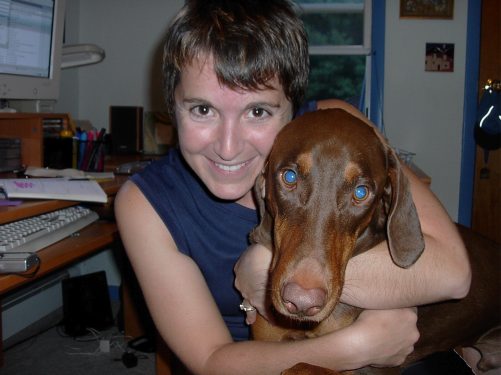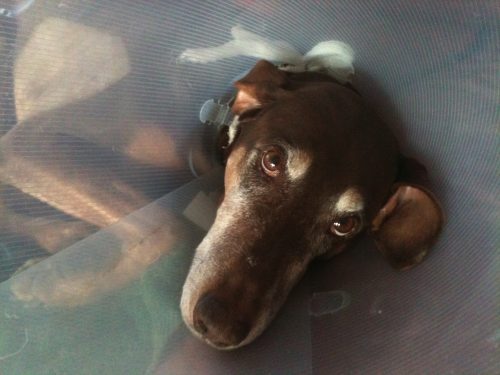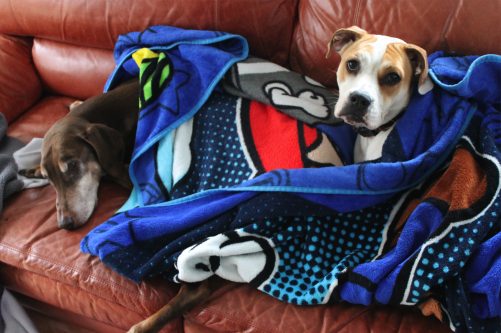A Long and Rambling Post with a Question at the End
When I first laid eyes on him, he hung his head so low that his snout almost grazed the floor. His tail was tucked and his spine and ribs were showing. He was so filthy that my hands became soiled when I stroked his side.
They’d found him tied to a telephone pole during a torrential rainstorm.
I couldn’t stand to think of the kind of person who would abandon a dog like that, so I choose to believe that his owner had dropped dead of a heart attack. This belief, of course, didn’t jive with the dog’s poorly cropped tail—a tail that could only have been cropped by a novice and not a vet. It also didn’t explain the rough edges along the dog’s ears—edges that spoke to some sort of abuse.
Still I choose to believe in the heart attack, because the alternative was just too painful. I choose to believe the owner’s last thoughts were, “Please someone help my dog.”
I was that someone.
When I adopted the 8-month-old dog, his name was Butch. The shelter told me that he was a Weimaraner mix. He seemed calm and docile.

It turned out that he was not a Weimaraner. Nor was he calm. He was a red Doberman, one with so much energy that he could run full out for six miles and still be up for a game of fetch. I changed his name to Rhodes, after Cecil J and also after the Greek Island I hoped to some day visit and also after a chiropractor that we loved and also because I thought it would be funny to say “Rhodes loves to run on the roads,” an expression that, I would eventually never once say.
The thing I remember most about the beginning: he was hungry. He ate his food in seconds. Then he licked every spec from the floor and even from the molding. After adopting him, I no longer had to sweep or mop. He became my vacuum.
He was more dog than I could handle. On our first walk, he darted after a bunny, pulling me forward with such force that my feet came out of my shoes and I landed on the pavement in a belly flop.
My nephew, who was just a toddler back then, thought Rhodes’ name was “bad dog.”
Obedience training was in order. During the first class, he yanked me around the room as he explored one dog’s anal cavity after another. The teacher taught something called the dominant down—during which one holds their dog’s neck to the floor. Everyone’s dog submitted right away, except for mine. Mine? He thought the whole thing was a giant play session—a wrestling match, if you will. He gnawed on my arms and flopped here and there until he got away.
The teacher disciplined me like a drill sergeant disciplines a new recruit. Her words were condescending and nasty. If I’d had a choice, I would never have gone back. But at home the dog was destroying couches, eating the remote access keys to my car, and generally bullying me. I thought I had no choice.
By the end of obedience, the dog knew all his commands and everyone in the class voted him “Most Improved Dog.”
He would go on to learn commands that I wasn’t trying to teach him. If I said, “Outside” he would walk to the door. If I asked, “Are you hungry?” he’d wag his tail and walk to his dog bowl. Those are just two examples of many.
It’s hard to tell the story of how a dog captures your heart. Our life together has not been dramatic. He never once rescued me from a well. Nor did he protect me from an advancing mother bear.
He did, however, chase many a squirrel from our yard.

He watched television with me for hours on September 11th. He was with me when I sprained my ankle in the woods, and he stayed by my side as I hopped home, too. When I had a stomachache, he curled up against my abdomen.
When I was pregnant, he guarded me.
When I woke repeatedly in the middle of the night to feed the baby, he woke, too. He followed me into the nursery. Then he curled up by my feet. Then he followed me back to bed.
When I sobbed from fatigue and post partum depression, he sat by my side.
He was loyal like that. As I walked here and there, he followed, the side of his head gently touching my hip.
Once, on New Year’s Eve, he ate everything off the plate of the one person in the room who hated dogs.
Another time my husband left some Italian sausages on top of the stove to cool. In the fewer than sixty seconds it took for my husband to walk from the kitchen to another room and back again, the dog had gulped down five entire sausages.
He figured out how to unzip the kid’s lunch bag and remove the contents, without putting a single rip in the bag.
He was a gifted food thief. I couldn’t help but admire his skills.
I loved watching him bound playfully in the yard. I cringed whenever he would hunt butterflies. I sighed when he ate the only strawberries that grew in my garden.
Once at a dog park, he chased a lab into an algae-covered lake. That’s when I learned that he couldn’t swim. I frantically removed my shoes and was just about to jump in when another dog swam up to him and gently nudged him toward the shore.
I cried.
Everyone loved him. It seemed no matter where I went—whether it was to the vet, to the boarders, or to a park—people made a point to tell me, “He is such a good boy. He is such a good dog.”
Whenever I walked him, neighbors stopped me. “That is such a handsome dog,” they’d say as they petted him. “What kind of a dog is he?”
It was somewhere between the second and third syllables of the word “Doberman” when I saw the fear flash over their faces.
“A Doberman?” they’d ask rhetorically as they backed away.
I learned to say that he was a “mixed breed.”
He was silky, sleek and fit, and he had a curious smile and bright eyes that were always eager to explore. Until he was eight or nine, strangers called him a “puppy.” They were amazed when I told them his real age.
It was slightly less than a year ago when I realized he was no longer a puppy. That was the day I held up his leash and said, “Let’s go for a run!” Instead of panting and wagging his tail, he curled up on the couch and gave me a dirty look.
I knew he was older still when he began sleep on his dog bed instead of in bed with me.

And even older when eating—an activity that had once brought him so much pleasure—became a chore.
The life expectancy for a dog his breed and size is nine to twelve. He’s somewhere between 14 and 15.
He’s severely anemic. “He probably has cancer somewhere,” the vet told me.
I can tell that she’s almost as sad about this as I am.
As I told you, everyone loves him.
I could pay for a full body X-ray followed by various ultrasounds, but I won’t. I’m not forgoing medical treatment because of a lack of love. No, it’s the reverse. I love him too much to put him through it.
There are not many things that he hates, but being poked and prodded by the vet is one of them.
He’s lost 15 pounds in the past year. His spine and ribs are visible again. So is the crease at the top of his skull.
His legs are stiff. He moves with discomfort.
Life, for him, offers little joy.
He suffers now, and he will suffer more.
And then he will die.
That’s inevitable.

I can’t stop his suffering. No one can.
But I can bring small bits of light into his final dark days.
I cheer him on when he finds an abandoned ice cream cone during our morning walk.
I help him curl up in the sunniest spot of the house.
I’m a vegetarian—almost a vegan—but I feed that dog anything he’ll eat: ground beef, chicken thighs, scrambled eggs, gravy.
In the middle of the night, as he paces around the house, I talk to him tenderly and carefully caress his face.
I pet him as much as I can.
But I also leave him alone when that’s what he wants.
And that’s what this has taught me: sometimes suffering beings need what we don’t want to give. They need space. They need quiet. They need to be alone.
And, eventually, they need us to quietly and strongly sit back and allow them to peacefully slip out of this world and into another.
It’s not easy. Sitting with someone else’s pain never is.
But I would not have it any other way.
Would you?
My questions for you:
- If a very old living being was sick—and there was an incredibly expensive and invasive solution that might extend this being’s life for a few months or possibly a year—would you opt for it?
- When would you help a suffering living being move from this life to the next?
- Would you want your eight-year-old kid to be present as this being took his final breaths?
- How can we best support others who suffer, especially during their final days and hours?
